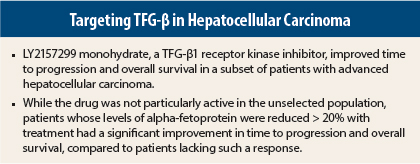Promising efficacy in advanced hepatocellular carcinoma patients was reported for a novel transforming growth factor–beta receptor type 1 (TGF-β1) kinase inhibitor, LY2157299 monohydrate, at the 2014 Gastrointestinal Cancers Symposium in San Francisco.1 In particular, patients with moderate to poorly differentiated tumors that overexpressed alpha-fetoprotein had improved time to progression and overall survival, suggesting alpha-fetoprotein may serve as a biomarker for this compound, reported Sandrine Faivre, MD, PhD, a medical oncologist at the Hôpital Beaujon in Clichy, France.
“LY2157299 displays a suitable safety profile for patients with Child-Pugh stage A or B7 hepatocellular carcinoma,” Dr. Faivre reported.
Why Target TGF-β1?
“TGF-β signaling is associated with progression in hepatocellular carcinoma,” she noted. TGF-β has a role in modulating E-cadherin, [alpha-fetoprotein], and T regulatory cells. LY2157299 is a TGF-β receptor 1 kinase inhibitor that has antitumor activity in various hepatocellular carcinoma models, and has demonstrated a favorable toxicity profile in patients with glioma.
In the current study, inhibition of TGF-β1 receptor by LY2157299 was associated with pharmacodynamic effects, resulting in decreased alpha-fetoprotein, TGF-β1, and E-cadherin serum levels. The study enrolled 109 patients with advanced hepatocellular carcinoma who had disease progression on or were ineligible to receive sorafenib (Nexavar), who had received only one prior systemic regimen, and who had elevated alpha-fetoprotein levels (a population with enriched TGF-β signaling).
Patients with Child-Pugh stage A or B7 hepatocellular carcinoma were randomly assigned to receive LY2157299 monohydrate, administered for 14 days of a 28-day cycle in doses of either 160 or 300 mg/d. The doses yielded similar safety and activity results, with 300 mg/d achieving a better drug exposure.
By RECIST criteria, approximately one-third of the patients achieved stable disease, but the pharmacodynamic effects on three prespecified potential biomarkers were more impressive, she reported. A > 20% reduction from baseline alpha-fetoprotein was observed in 24%; a > 20% reduction in TFG- β1 was observed in 53% (and in 72% of alpha-fetoprotein responders); and a > 20% reduction in E-cadherin was observed in 43% (including 36% of alpha-fetoprotein responders).
Robust Results
For the whole population, the median time to progression was 2.8 months and median overall survival was 8.3 months, and there were no differences between the two dose levels. In contrast, for “alpha-fetoprotein responders”—ie, the 24% of patients with > 20% reduction in alpha-fetoprotein baseline levels—outcomes were much improved, she reported.
For alpha-fetoprotein responders, median time to progression was 4.3 months, vs 1.5 months for nonresponders (P < .0001), and median overall survival was 21.4 vs 6.8 months, respectively (P < .0006).
“A proportion of patients with an [alpha-fetoprotein] response showed very sustained disease control and long overall survival,” she added.
Interestingly, when analyzed according to baseline alpha-fetoprotein levels, response rates to treatment were not different between those with elevated alpha-fetoprotein (≥ 200 ng/mL) or normal alpha-fetoprotein (< 200 ng/mL).
“High baseline [alpha-fetoprotein] remained prognostic for poor outcomes,” she noted. Among this group of 74 patients, median time to progression was 12 weeks and median overall survival was 30 weeks. Among patients with alpha-fetoprotein < 200 ng/mL at baseline, however, responders had at least a 70% reduction in risk for both progression and death, vs nonresponders.
Biomarker Is Key
Dr. Faivre acknowledged the 8-month overall survival for the whole population is on par with the median overall survival for placebo arms in other studies, but she emphasized that the benefit will most likely be limited to a biomarker-defined subgroup.
“Using [alpha-fetoprotein] monitoring, we showed the subset of patients who benefited from this treatment. Probably the majority of the others will not benefit from this approach,” she commented. ■
Disclosure: Dr. Faivre has received honoraria and research funding from Lilly. For full disclosures of the study authors, visit meetinglibrary.asco.org.
Reference
1. Faivre SJ, Santoro A, Kelley RK, et al: A phase 2 study of a novel transforming growth factor-beta receptor I kinase inhibitor, LY2157299 monohydrate, in patients with advanced hepatocellular carcinoma. 2014 Gastrointestinal Cancers Symposium. Abstract LBA173. Presented January 17, 2014.



